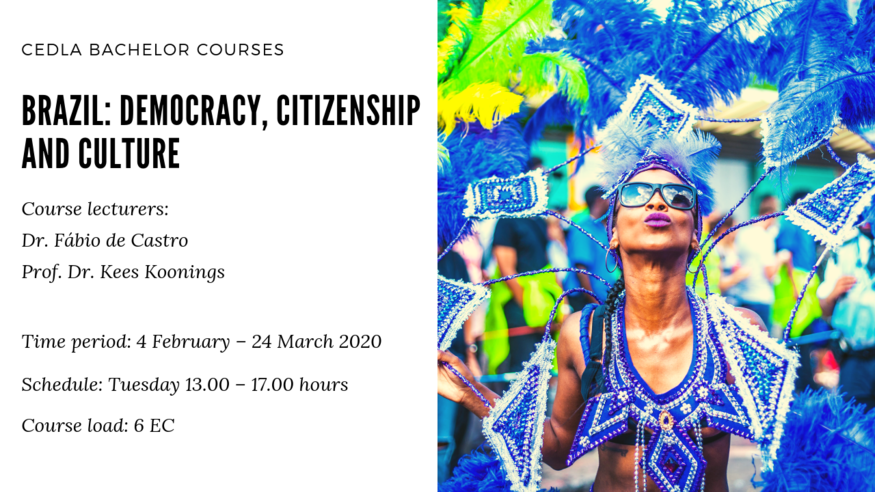REGISTER NOW!!

Course lecturers: Dr. Fábio de Castro and Prof. Dr. Kees Koonings
Time period: 4 February – 24 March 2020
Schedule: Tuesday 13.00 – 17.00 hours
Course load: 6 EC
UvA Course Catalogue Number: 137217146Y
MORE INFORMATION
This course addresses historical development and contemporary dynamics of the modern Brazilian society. As the fifth largest country in the world and one of the tenth largest economies, Brazil plays a major role in economic and social processes in Latin America and is an increasingly prominent player in regional and global politics. The recent (post-2000) socio-political development of Brazil is characterized by a ‘boom and bust’ cycle, not only in economic terms but also with respect to democracy, social justice, and international standing. Whereas the previous decade was marked by a more inclusive pattern of economic growth, reduction of poverty and inequality, and vibrant debates on the expansion and diversification of citizenship, after 2010 mass protests, economic decline, and political turmoil set the stage for a ‘neoconservative turn’ of which the election, in October 2018, of an extreme right wing politician to the presidency has been the most visible (but certainly not the only) consequence. The course seeks to look beyond the current crisis in order to understand the socio/economic, environmental, political and cultural transformation of the largest Latin American country. The concepts of democracy, citizenship and culture will help us to frame key dimensions of this transformation. Democracy refers to the changes in the political order. Until recently, democratic political stability was an important factor for relatively successful development during the past 25 years in Brazil. Citizenship is not only fundamental for democratic politics but also speaks to the challenges in the field of security, wellbeing, inequality, identity, diversity and participation. Brazil is often seen as a paradigm of unequal or ‘disjunctive’ citizenship. Culture refers to changing values, identity and practices in both urban and rural spaces.
Picture License![]()
![]()
![]() Some rights reserved by Rémi.
Some rights reserved by Rémi.
Van 4 februari om 13:00 t/m 24 maart 2020 om 13:00

